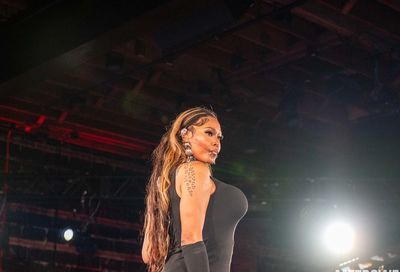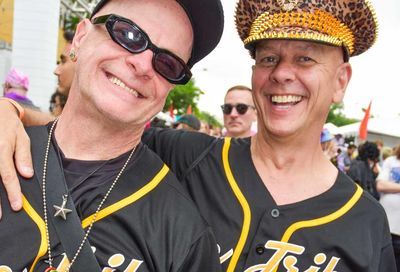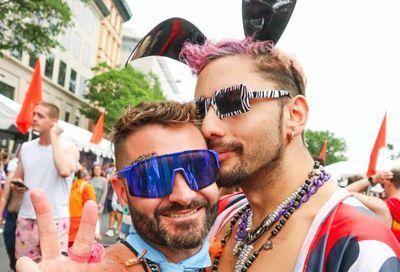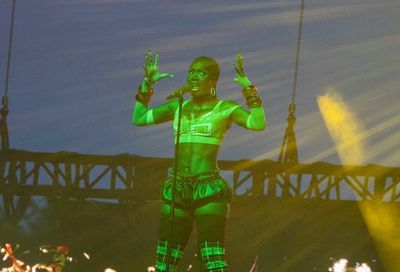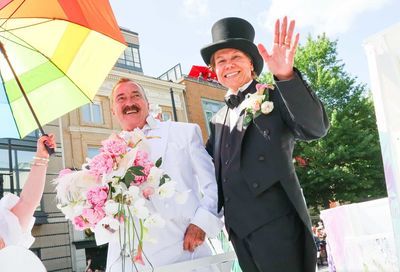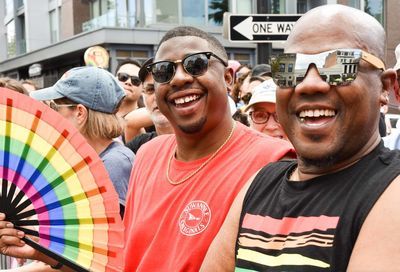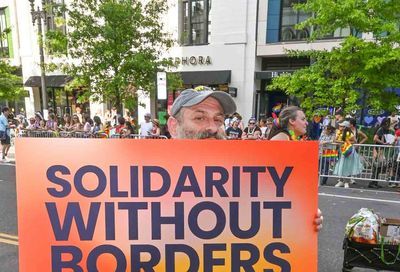Minority Report
Learning Curve
Just like that, I’m not a criminal any more. With the Supreme Court ruling on Lawrence v. Texas, I can cross Key Bridge from Georgetown into Virginia without transforming into a felonious sodomite en route. Now, in good conscience, I can break my hard rule against spending money in the Commonwealth of Virginia by perhaps downing a latte at National Airport before I grab that Delta shuttle to New York to visit my girlfriend in Queens.
How did you react to the Court’s gay rights decision? I spent an exuberant, optimistic afternoon on June 27th e-mailing pals far and wide: “I’M FREE!” — and even changed the outgoing message on my answering machine to brag, “You have reached the home of a free and equal citizen of the United States.” Many of my friends (and exes) e-mailed back, confessing to their own tears of joy, while others predicted a longer road of struggle ahead. For the moment, however, I sought only celebration. I bounced over to 17th Street expecting something akin to the end of World War II in Paris, but as usual, the staid queers of D.C. did not choose confetti-strewing mayhem. Yet there were unmistakable signs of change: heads held higher, American flags suddenly waving from gay households, strangers smiling at strangers in the ice-cream-drippy night. Looking out over the laughing crowds going in and out of gay restaurants, I wondered: how will this ruling alter us?
For centuries we’ve been outlaws. That has seldom been a boast, but it’s often been an attitude: legally, we’ve been a persecuted minority, entitled to our activism. The threat of losing a leadership role, a job, child custody, or a potential adoption, based on state sodomy laws, haunted many of my friends. Others — Bible scholars — spoke endlessly to the excellent point that the story of Sodom and Gomorrah really seems to be about rape and incest, not homosexual activity or oral sex per se. Rape and incest continue to occur at a national rate that shames our society, yet assaults on women and kids seem far less distressing to the conservative judiciary than committed, same-sex love. But now, at least, a legal distinction has been made, simultaneously freeing straight couples to enjoy “sodomy” themselves without fear of arrest.
So have we joined the mainstream overnight? Hardly. That despised-minority status must be dismantled through endless, tiring work. And I had occasion to think about what it means to be a minority earlier this spring when a student asked me to speak on a “minority women and leadership” panel at George Washington University. On that panel, sponsored by the campus NAACP, I would be the only white woman.
At first I assumed I’d been invited because my students perceive me as an ally in the fight against racism, and an advocate for women of color and their ongoing empowerment in academia. Then I privately acknowledged to myself that I, too, might identify as a minority woman facing challenges to leadership in America — because I’m gay. The student who had invited me made clear that that was why I had been sought, and the NAACP group hoped I’d speak about my own experiences.
I re-read an excellent article Henry Louis Gates. Jr. once contributed to The New Yorker — “Blacklash?” It began with “All prejudices are not equal. But that doesn’t mean there’s no comparison between the predicaments of gays and blacks.”
Gates had addressed the “demonization” of gays as a “species” and acknowledged the shame and very threat of violence experienced by despised minorities. He also acknowledged that whereas many African-Americans sought refuge in church networks throughout civil rights challenges, in the case of gay rights, church doctrine has often been a key oppressor, rejecting and excluding. And, of course, in the center of the overlapping worlds are the identities of gay men and women of color, who learn racial but not gay survival codes from parents. I spoke to these connections from my seat on the panel.
The defeat of sodomy laws, following so closely after the Court’s avowal of affirmative action, links two battles against minority oppression. Though I have overheard white gays trash affirmative action as often as I have heard black and Hispanic heterosexuals trash gay people, I believe we are closer now to truth-telling about the toll of invisibility, under-representation, and cultural hatreds that weigh on minority communities of any kind.
I am only beginning to examine what it means to be redefined as legal, and to understand what psychological damage the mantle of illegality has meant, over time, for my community.
Bonnie J. Morris, Ph.D., is on the women’s studies faculty at George Washington University. She can be reached at bmorris@metroweekly.com.
Support Metro Weekly’s Journalism
These are challenging times for news organizations. And yet it’s crucial we stay active and provide vital resources and information to both our local readers and the world. So won’t you please take a moment and consider supporting Metro Weekly with a membership? For as little as $5 a month, you can help ensure Metro Weekly magazine and MetroWeekly.com remain free, viable resources as we provide the best, most diverse, culturally-resonant LGBTQ coverage in both the D.C. region and around the world. Memberships come with exclusive perks and discounts, your own personal digital delivery of each week’s magazine (and an archive), access to our Member's Lounge when it launches this fall, and exclusive members-only items like Metro Weekly Membership Mugs and Tote Bags! Check out all our membership levels here and please join us today!




















